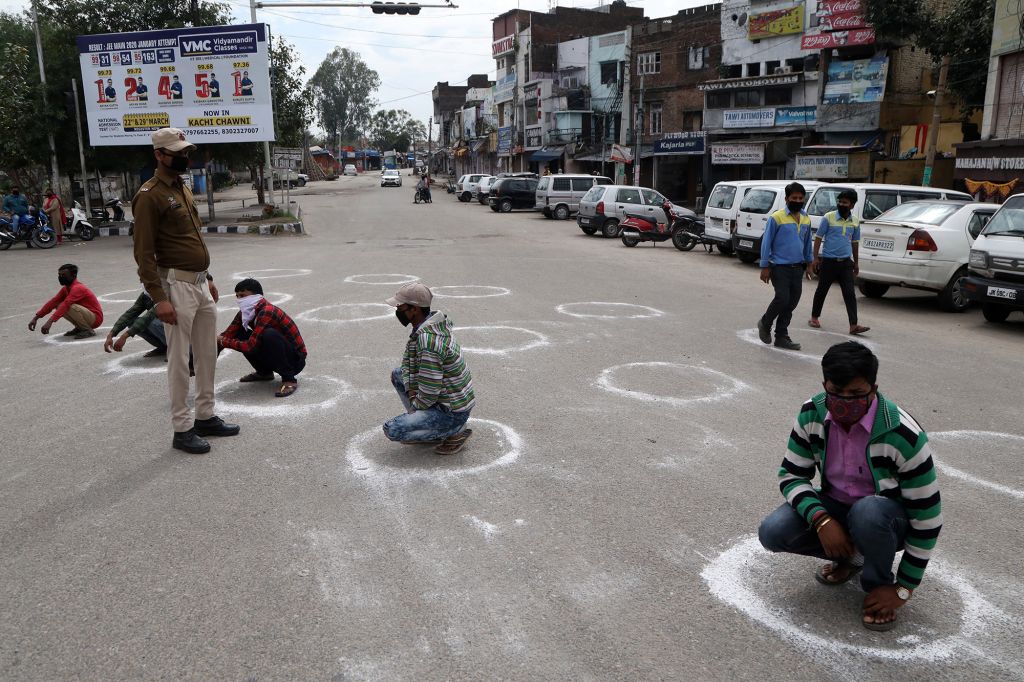
In the midst of a global pandemic, as COVID-19 and lockdowns grip the world, many of us feel a sense of pause, like the breaks were suddenly pulled all around us — and for many of us, there is only a mythology of pause, since the violence that plagued our lives before COVID-19 continues to impact us, if not in more terrible ways than before.
The spaces we get to occupy are deeply political, and the current pandemic that is requiring us to stay confined in spaces is a blatant reminder of that reality. Much of the world’s structures of privilege and oppression have manifested through the spaces we lay claim to, the spaces we are forced into, the spaces we are forced out of — colonial expansion, racist and casteist segregations, capitalist ownerships, the foundation of prisons. Our caste and relationship to the State dictate the everyday spaces we occupy: the vastly unequal and casteist land distribution during the Partition of India and Pakistan, working in an air conditioned cubicle versus manual scavenging in sewers, getting a seat on the sofa versus a space on the floor.
For many of our communities, the impact of COVID-19 is compounded by settler colonialism, caste supremacy, Islamophobia, police brutality, military violence, mass deportation, and incarceration. Much of this violence is based on the spaces we occupy based on caste, religion, and nationality. It has been less than two months since Delhi witnessed a mass pogrom against its most vulnerable Muslim communities, when Muslims were murdered by Hindu mobs in Northeast Delhi, their spaces of business destroyed, their places of worship burnt down, pushed out of their homes and forced into crowded resettlement camps, their options for safety and social distancing taken away days before the virus reached Delhi. Racism and Islamophobia didn’t come to a pause in India, as Northeast Indians are under attack and facing increased racism throughout the country, while Hindu fascists have created Islamophobic narratives blaming Muslims for the spread of coronavirus in India. All of these acts of violence become possible when savarnas claim ownership of the national space. Such instances of spatial violence are taking place all over South Asia. In February, a Christian man was murdered in Kasur for “contaminating” the well he bathed in, breaking the religion and caste coded “social distancing” from the privileged that has been enforced for centuries. Social distancing did not begin with COVID-19, but instead has been a building block for the nation states.
The creation of borders through militarization has promoted the idea that the “security” of the space within the borders holds more value than actual lives. When COVID-19 lockdowns were enforced across South Asia, migrant workers across the region were left with few options to return to their homes, their right to safe spaces completely ignored by nation states – one such example being Nepali migrant workers stuck without access to safe spaces on either side of the India/Nepal border. Afghan refugees in Pakistan, many of them daily wage workers, remain without access to healthy living conditions — their spaces first destroyed by the US War on Terror, and their particular nationality not affording them the right to space within the borders of Pakistan. Rohingya refugees continue to live in crowded resettlement camps in Cox’s Bazaar, with no access to internet or phones since the Bangladeshi government suspended services for the camps in September last year — their spaces robbed by Myanmar as they were forced into cramped spaces within Bangladesh to survive. The Indian State’s brutal occupation of Kashmir through control of the region’s land and resources has forced a lockdown in the region since last August, depriving Kashmiri people access to internet and phone services and hence limiting their information about COVID-19.
The question we are faced with now is how we can rebuild spaces that have been shaped by violence. We are tackling lockdowns in parts of the world where Kashmir has already been subjected to oppressive lockdowns by the Indian State. We are tackling self-isolation in parts of the world where communities have been forced into crowded slums and resettlement camps with few options for privacy, let alone isolation. When we are past this moment of social distancing, will the world continue as one where savarnas murder oppressed castes and religious minorities for not practicing “appropriate” social distancing from them? Will this moment’s heavy reliance on police and military strengthen the systems that regularly perpetuate the most invasive and violent contact? Will we continue on in the structure that exploits Dalit Bahujan labor and takes away their very right to space in order to afford savarnas their private and sanitized homes? What will it take for our communities to heal from the pandemic that is taking the lives of those who the State never afforded the right to safe spaces?
In a region that has been built on caste supremacy and settler colonialism, healing from the pandemic will not only entail getting past COVID-19; it will require rupturing the cycles of violence that uphold our nation states. Healing will require a radical shift in the way spaces are occupied and marked. Healing will demand that reparations begin with savarnas giving up their claim on spaces they stole from indigenous and caste oppressed communities. The project of spatial expansion and control needs to be replaced by a movement for the abolition of borders and ownership. Healing from this pandemic will require an end to capitalism, caste, and policing — an undoing of every structure that allows the continued violence of denying someone their space of dignity and safety.
Divya Chand currently works with immigrants and people of color who have experienced sexual violence, domestic violence and/or human trafficking in Seattle. To break cycles of violence, Divya centers the politics and ethics of prison and military abolition as a way to dismantle white and savarna supremacy. Email: [email protected]
SIGN UP FOR COUNTERCURRENTS DAILY NEWS LETTER











































